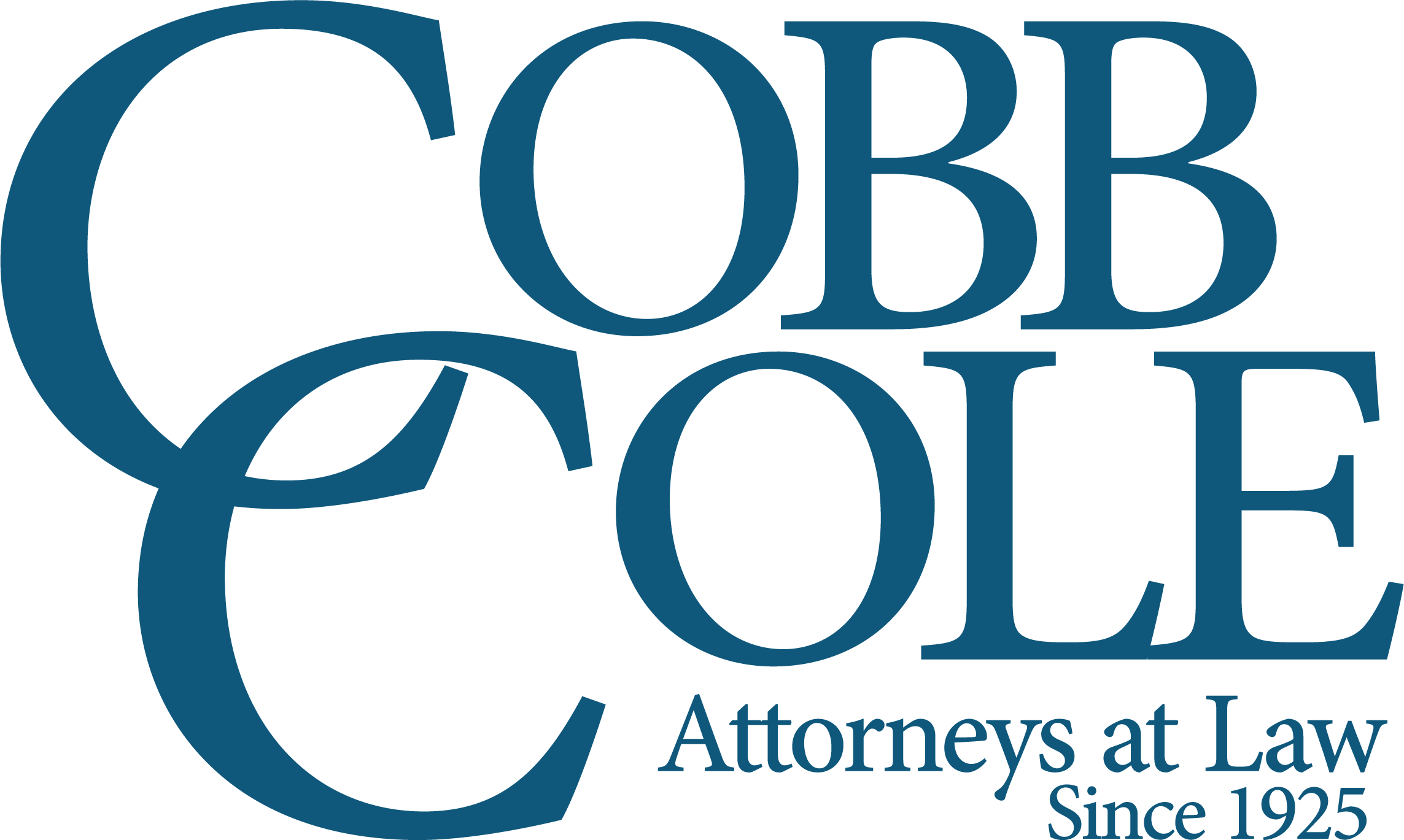Starting a new business is an exciting venture filled with vision, creativity, and potential. It is also a process that requires meticulous legal planning to avoid costly mistakes and set a strong foundation for growth. Entrepreneurs often focus on product development, funding, and branding, but tend to overlook the equally important issues of legal structure and operational frameworks. The attorneys at Cobb Cole’s Corporate & Business Law group understand the unique needs of startups and offer guidance to help founders navigate these early and critical stages.
Business Formation: Selecting the Right Structure
Choosing the right business structure is one of the first and most significant decisions a founder must make. As discussed in this helpful video from Cobb Cole, the structure you select will depend on your goals, liability concerns, and operational preferences. There are a multitude of potential legal structures, including, without limitation, corporations, partnerships, and limited liability companies (LLCs), with each offering different protections, rights, and liabilities.
Selecting the right structure not only affects taxation and liability but also impacts relationships among owners and the company’s ability to raise capital. In some cases, multiple entities may be advisable, such as creating a real estate (or intellectual property) holding company and a separate operating company, with the operating entity leasing property (either real property or intangible property) from the holding company.
Working with experienced corporate attorneys ensures that incorporation or organizational documents, operating agreements, and shareholder agreements are drafted correctly and tailored to the owner’s specific objectives. Starting with the right legal foundation saves startups from facing complex restructuring or unforeseen liability later.
Governance and Internal Agreements
Once the entity is formed, attention must shift to establishing clear governance policies. Many startups are founded by close friends, family members, or former colleagues. While this closeness can be great for innovation, early commitment, and flexibility of startups, it can present problems in scaling up the operation later down the line. Without proper internal agreements, minor disagreements can escalate into legal battles. To avoid these problems, founders should work with legal counsel to draft operating agreements, shareholder agreements, and bylaws that define:
- Ownership interests and capital contributions and financial obligations
- Voting rights and decision-making processes
- Roles and responsibilities of members or directors
- Procedures for resolving disputes
- Rules for selling or transferring ownership
Strong internal agreements promote transparency and help maintain healthy working relationships. As highlighted in Cobb Cole’s discussion on business lifecycle representation, consistent legal representation through each phase of a business’s growth helps preserve stability and anticipate challenges before they arise.
Regulatory Compliance
Most startups must comply with a wide range of local, state, and federal regulations. Failing to register properly, obtain required licenses, or comply with employment and tax laws can expose a company to fines, lawsuits, or forced shutdowns. Areas where startups often require early legal guidance include:
- Business registration with the state of Florida
- Zoning and land use compliance if operating from physical locations
- Licenses or permits for specific industries (e.g., food services, health care)
- Compliance with IRS and state regulations for payroll and income taxes
- Understanding Florida-specific employment laws
Startups involved in professional services, health care, technology, or finance may face additional licensing requirements that must be addressed at the outset. Other compliance and regulatory considerations may also apply depending on the products or services they offer. Securing the right permits and operating within regulatory frameworks builds credibility and protects the company’s long-term viability.
Intellectual Property Protection
Ideas are the lifeblood of startups, but without protection, valuable intellectual property (IP) can be lost. Corporate lawyers assist founders in safeguarding IP assets such as:
- Trademarks for branding elements like logos and business names
- Copyrights for original content, software, and creative works
- Patents for inventions and novel processes
- Confidentiality and non-disclosure agreements (NDAs)
Early action is critical. For example, a startup developing a proprietary app needs to ensure its source code, brand, and user interface are protected from competitors. Similarly, founders should consider assigning all IP rights developed by employees or contractors to the company itself through employment contracts or consulting agreements. For companies that work with trade secrets or sensitive and confidential material, ensuring IP is protected through employee non-disclosure agreements (NDAs) and non-compete clauses is another role corporate counsel can play.
Funding and Capital Structure
Securing funding is another area where startup founders benefit from legal guidance. Whether the goal is to attract angel investors, venture capital, or secure small business loans, corporate lawyers help structure investment and/or debt deals to protect founders’ interests while appealing to investors and lenders. Corporate lawyers can draft documents, including term sheets, subscription agreements, and SAFE (Simple Agreement for Future Equity) notes- all of which can be essential tools in early fundraising.
It is equally important to set clear terms for equity ownership, vesting schedules for co-founders and employees, and dilution protections for early investors. Poorly structured fundraising can result in loss of control, unanticipated tax consequences, or disputes among stakeholders. Having the right documentation and advice ensures founders understand the long-term implications of each funding decision.
Risk Management and Contracts
Startups must also manage operational risks through carefully drafted contracts. From supplier agreements to customer contracts to terms of service for online platforms, contracts should allocate risk fairly and protect the company’s interests. Common contract needs for startups include:
- Vendor and supply agreements
- Distribution or manufacturing agreements
- Employment contracts and independent contractor agreements
- Restrictive covenant agreements
- Customer agreements and service terms
- Data privacy policies for online operations
An overlooked or poorly drafted contract can expose a company to breach of contract claims, regulatory penalties, or intellectual property theft. Reviewing and negotiating these agreements with legal counsel ensures that obligations, remedies, and limitations of liability are appropriately defined.
Preparing for Growth and Exit Strategies
Although most startups are focused on immediate survival and growth, planning for eventual sale, merger, or expansion is a smart business strategy. Preparing for future transitions might involve:
- Setting up incentive equity plans (e.g., stock options) to attract and retain talent
- Establishing proper financial record-keeping and corporate governance practices
- Structuring operations for scalability
- Developing an exit plan in shareholder or operating agreements
Many startups are caught off guard when acquisition opportunities arise, only to find their corporate records incomplete or their ownership structures unclear. Early and ongoing legal counsel helps position the company for a favorable exit when the time is right.
For all of these reasons, qualified business lawyers play an essential role in startups and entrepreneurial undertakings. Entrepreneurs who partner with the right attorneys from the beginning can focus more fully on building their business, knowing that foundational legal matters are properly handled. The Corporate & Business Law group at Cobb Cole provides entrepreneurs with the legal framework to support not just formation, but also sustainable, long-term success.

